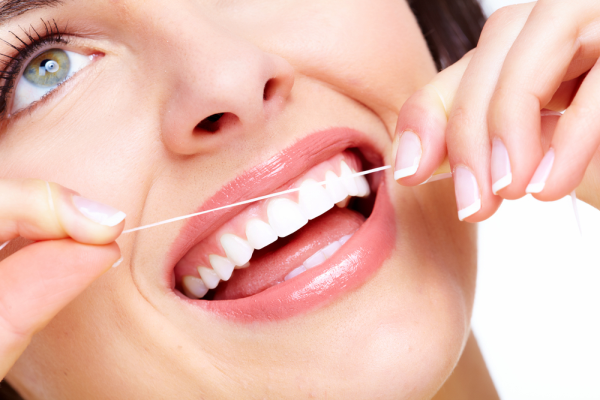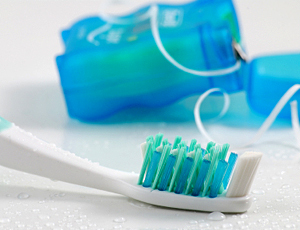
Regular flossing can do more than just keep your smile pretty and healthy.
Many people make a point of brushing their teeth twice a day, but fewer follow the recommendation to floss at least once a day. Regular flossing can do more than just keep your smile pretty and healthy. Read below to find out how adding flossing to your daily routine plays an important role in your oral hygiene and overall health:
 Flossing Prevents Tartar Build-Up
Flossing Prevents Tartar Build-Up
Tartar is a hard build-up of plaque that forms around the gum line. Once it’s there, it has to be removed with professional help. Flossing on a regular basis is a powerful tool to help fight this stubborn problem as it allows you to remove the plaque that causes tartar while it’s still in its early sticky, but soft and pliable form. To successfully fight tartar, combine flossing with brushing. Flossing removes build-up around the gums and brushing with a fluoride toothpaste removes plaque, while strengthening the tooth enamel at the same time.
Flossing Helps Prevent Other Diseases
Did you know that tooth and gum disease can have effects that go way beyond tooth discolouration, discomfort or bad breath? Research has shown that the bacteria that flourish in an unhealthy mouth can harm the rest of the body. This can lead to heart disease, diabetes, respiratory illnesses and even Alzheimer’s disease. These potentially life-threatening diseases can be avoided by simply improving your oral health. This is more than enough reason to start flossing. Flossing only takes a few minutes every day, and adds little to the cost of toothpaste, toothbrushes and mouthwash.

Flossing Can Save You Money
Professional dental tools and procedures are highly advanced, and can repair even severe medical problems, but ask your dentist what the best tools are for protecting oral health, and the answer you’re most likely to get is a toothbrush and box of floss. Flossing is also cost-efficient. It is cheap and will reduce your medical expenses and dental visits.
Flossing Protects Your Gums
The places where the gums and teeth meet are where flossing plays its major role. Tiny particles of food can get lodged here, and plaque in this area will harden over time to form tartar. Tartar buildup can lead to gingivitis – red, swollen gums that are the first stage of gum disease. If left unchecked, this tartar can spread even deeper below the gum line, causing severe gum disease characterized by severe inflammation and eventual tooth and bone loss. Floss can get into the space between the teeth and gums, removing much of the food and plaque that a toothbrush or mouthwash can’t.
 Flossing and Brushing Are More Effective Than Brushing Alone
Flossing and Brushing Are More Effective Than Brushing Alone
Brushing your teeth twice a day will go a long way toward maintaining oral health, but you’re not getting optimal cleaning if you’re not flossing daily. A toothbrush works by physically removing plaque from your teeth with its soft bristles, but a toothbrush’s bristles can’t adequately clean between the teeth or under the gums. Flossing, on the other hand, was made to specifically remove plaque from the tight spaces between the teeth and under the gums. Flossing before you brush helps make brushing more effective. With less plaque caught between your teeth, the fluoride in toothpaste can get to more parts of your mouth.
Small and simple, but with huge implications for your long-term health… Who would have thought? Will you become an avid flosser now?
Article by: Kelly Abrahams

